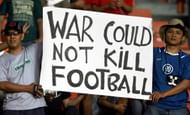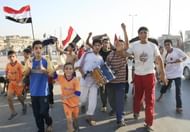Iraq clinch the Asia Cup in 2007
On July 29, 2007, Iraq scripted one of the most memorable fairy-tales in sporting history. They beat Saudi Arabia 1-0 in the final to win the Asia Cup and provide a moment of great joy to their war-torn nation.
The Saudis were bidding to become the first-ever four-time winners of the event, but the Iraqis, who had become the darlings of the tournament as well as the whole world, rode a huge wave of popular sentiment to cause a major upset.
It was all the more remarkable as they had beaten two of the favourites back-to-back after getting past South Korea in the semi-finals.
That match ended goalless after extra-time and went to penalties where Iraq’s custodian Noor Sabri turned out to be the hero as he saved the fourth spot-kick from the Koreans. The fifth kick from the Koreans then hit the post to send Iraq into the final.
Younis Mahmoud scored the only goal of the final on 72 minutes to secure a first ever Asia Cup triumph for Iraq.
Few people had given the Iraqis any chance before the tournament started in the light of the war at home and with the players having suffered emotionally from the violence back home and quite a few of the players had even lost relatives in it.
Like Afghanistan, Iraq was invaded by a United States-led force, two years later in 2003; the premise of the war being the discovery of Weapons of Mass Destruction (WMD) in Iraq. It formed a part of the United States’ supposed ‘Global War on Terror’ and lasted nine years culminating with the withdrawal of US troops in 2011.
In this backdrop, the team had gotten together and united under Brazilian coach Jorvan Vieira, who had only two months to prepare a team that had players from varied ethnic backgrounds – Shi’ites, Sunnis and Kurdish players. Local infighting amongst different ethnic groups was common in Iraq at the time.
The team was forced to train and play qualifiers in neutral countries
“This is not just about football… this is more important than that,” Iraq’s Brazilian coach Jorvan Vieira told a news conference.
“This has brought great happiness to a whole country. This is not about a team, this is about human beings.”
Almost every member of the team had been touched by the war in some way or the other and played through much personal grief.
One of the tragedies of the war was that the team could not even return to Iraq with the trophy.
“I wish we could go, but you just don’t know who will kill you,” said Iraqi captain Mahmoud, who was named the best player of the tournament.
FIFA President Sepp Blatter, who was present at the final, had said that Iraq’s achievement had inspired millions and was proof of sport’s unique power to unite people in the most desperate of circumstances.
As these two fans rightly echoed through their poster, ‘War could not kill football’ !

Indonesian football fans hold up a placard before the start of the Asian Football Cup 2007 final match between Iraq and Saudi Arabia at Bung Karno stadium in Jakarta, 29 July 2007. Meanwhile Iraq declared an overnight vehicle curfew in Baghdad and stepped up security as the country braced itself for celebrations and possible bomb attacks following the Asian Cup football final.
